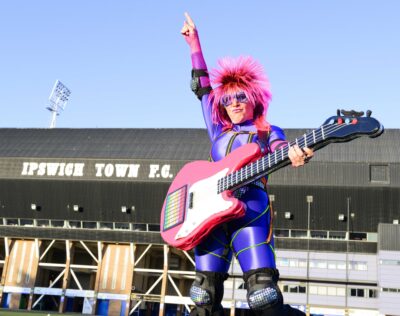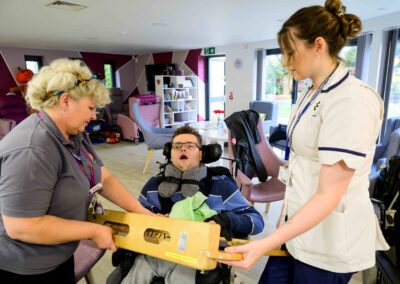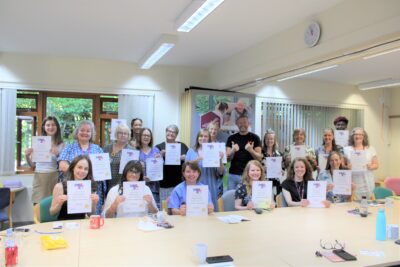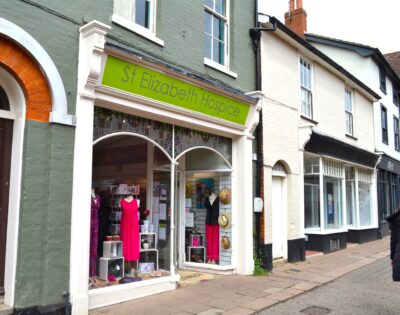Andy Priest’s Story

To write a wedding card for his six-year-old daughter to open on her special day, knowing he will not be there to see her marry – is the hardest thing Andy Priest has had to do.
He has managed to fill in cards and seal them for little Isobel to open every birthday until she is 21.
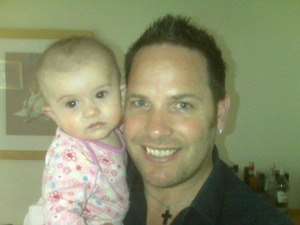
Andy, 45, who has a great sense of humour, has tailored each message as if he is watching her grow up. ‘You’ve grown into a beautiful little girl, and I am watching you and so proud of you supporting mummy’’ says one; another for her teenage years cheekily says she needs to help her mum more!
Andy still has not formed the words for her wedding wishes. He will, though, go out and buy a necklace for Isobel to wear down the aisle, and he will be with her in spirit.
Isobel was just two when Andy was diagnosed with leukaemia (cancer of the white blood cells). His three sons Declan, 23, Jordan, 21 and Liam, 18, from a previous relationship were old enough to understand but are finding it hard as they now live further away.
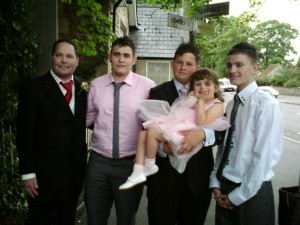
Sports-mad, super-fit and a body-builder, when Andy started to get severe leg pains in 2009 he knew something was wrong. Over the months it got worse yet his GP and doctors at the hospital where he lived in Oxford did not know why.
He said: “I was in so much pain, I could not sit down. My stomach had swelled out and I had lost one and a half stones in weight in two weeks. Looking back now they were the classic symptoms of cancer.”
A few months later in February 2010 the pain had got so bad Andy felt like he was dying; his wife Annette said he looked like he was. They dialled 999 and an ambulance took him to A&E – doctors said he had multiple organ failure and just two hours to live.
They diagnosed acute lymphoblastic leukaemia – more commonly a childhood cancer and extremely severe in adults, affecting just 350 a year.
Intensive chemotherapy, radiotherapy and whole-body radiation had to be started immediately if Andy was to stand a chance of surviving.
“We’ve got to start the treatment today, tomorrow will be too late. That’s what the doctors said,” recalled Annette. “They said there was a 20% survival rate and they had to hit it with everything.”
Amazingly he got through those two hours – they put it down to the fact that Andy was so fit – he regularly lifted weights, went swimming, played golf and squash.
After that he had to have a bone marrow transplant – fortunately his brother Jason was a match – and after the transplant, Andy had to spend several weeks in an isolated room.
“There was not time to hang around waiting for a donor, so we were lucky that Jason could help,” said Andy.
His quality of life has been blighted by many side effects from the treatment – lower resistance to infections, cataracts, diabetes, kidney, lung and heart problems (he has had three stents put in his heart), fatigue, memory loss and oesteroposis.
He also has severe gravt versus host disease (GVHD) a complication of high dose cancer treatment which occurs after a bone marrow transplant from another person.
His immune system was so low he caught many infections and was in and out of Churchill Hospital in Oxford.
But by the end of the year Andy was in ‘tentative’ remission – against all odds he had fought back and kept the leukaemia at bay. They could see a future again.

Sadly, not for long.
In January 2012 there was more bad news. Andy had contracted a serious bacterial infection called Pseudomonas. He now had permanent lung damage the only thing that could save him was a lung transplant, but the operation was too risky. The infection will kill him.
“It was crap. I had thought ‘brilliant’ I’ve got through leukaemia, there is light at the end of the tunnel. It was a miracle I got through those first two hours and then to get the blow that this was going to kill me; we just couldn’t believe it. I can feel it has got worse. I can feel it attacking me, my lungs.”
While in hospital his beloved mum Janet died of pancreatic cancer and his nan passed away six months later.
Breathless, weak, unable to sleep, lift up his daughter or do much for himself, Andy looks like a shadow of his former self. He is not. He is still Andy, a fighter, forthright, chatty and sociable with that wicked wit.
As we talk in their living room, the extraordinary love between Andy and Annette, who have been together for 18 years and married in 2001, is clear. The volley of banter goes back and forth between them, the seriousness of our conversation is interspersed with many more laughs than tears. They know each other inside out, Annette, 46, rubs his back while he struggles for breath, she has to speak for him when he gets tired and give him gentle reminders. He has been prescribed morphine for the constant pain, has six nebulisers a day and 30 tablets.
Andy had to give up his company – a Hydraulics and Engineering Company – and Annette her job – so she could care for Andy full-time. They had no money and did not know what to do. They had always worked, never claimed benefits.
Annette said: “When I went to the benefits interview at the Job Centre I was so humiliated; I broke down crying. We had no money and they were questioning why; they had no sensitivity towards our situation.”
Around this time they were approached through Sobell House Hospice in Oxford to appear in the Channel 4 documentary My Last Summer, which tackles taboos around death. Andy was one of five terminally ill people who talked frankly about their experiences as they faced the last months of their lives. The filming started in October 2012; the four became Andy’s friends.
Andy said: “We wanted to put the message across that if you have a terminal illness you don’t have to go home and die. I needed to change my life around to enjoy what I have left.
“We also wanted to show how important it is to talk about what you are going through – because nobody does. If you do, you lose friends.
“I also wanted to show that a Hospice is not a scary place where you just go to die.”
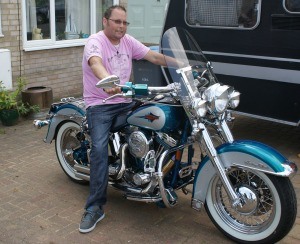
Mad about motorbikes, Andy had promised himself a Harley for his 50th birthday. Knowing he would no longer reach 50, Annette hired a bike for the afternoon and for the first time Andy’s emotion was captured on film as he realised the Harley was there for him.
Above all, the programme put them in touch with a financial advisor and that practical advice led to the family selling their Oxford home and downsizing to Suffolk.
In May 2014 they moved to Wickham Market. With Andy’s life insurance and the equity of their Oxford house, they have bought their home outright ensuring Annette and Isobel have a secure future.
They have dealt with more practicalities than most couples in this situation; from writing those personal cards to leave for Isobel to getting a yellow folder to record his end-of-life care choices and medical history in one place. Throughout 2014, Andy’s condition has deteriorated, but St Elizabeth Hospice has made the days he has left better. He knows he wants to die at home and if that it is not possible at St Elizabeth Hospice’s Inpatient Unit in Ipswich.
At home, he is visited by a clinical nurse specialist regularly and has had adjustments made to his house so he can be as independent as possible.
Annette has had counselling with the Family Support Team – being able to offload everything to someone outside the family has been crucial. She has also received practical advice like planning ahead, making a will and talking about your wishes. Isobel is due to get support.
“I used to think a Hospice is where you go to die. I thought crikey that is going to be awful, but it has given Andy a better quality of life,” said Annette.
Andy – who talks freely about his illness now – said counselling was not for him. What spurred him on to communicate so honestly was music therapy. He started writing and recording songs with renowned music therapist Bob Heath at Sobell House Hospice and continued when he moved to Suffolk.
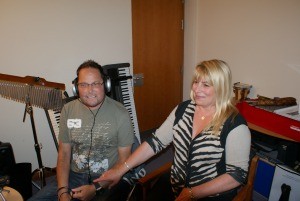
St Elizabeth Hospice’s music therapist Ray Travasso has worked with Andy to record two more songs during regular sessions at the Hospice or when visiting him at Ipswich Hospital. Andy has just written the final one for his album, My Words, My Voice – a labour of love; his legacy. The final song is dedicated to Annette. One song called A Space for Me, is about how Andy has a space saved in heaven, and this will be played at this funeral.
Andy said: “I never used to talk about what was going on. Then when I went to music therapy I just started writing songs from the heart and expressing it that way. I never knew I could write songs or sing, it really lifted me. The album I made has been my journey, it is how I have communicated what has happened to me. And it has given me a new lease of life.”
Since appearing on the programme, Andy and Annette have gathered a Twitter following with their frank and open tweets.
In some ways they see Andy’s diagnosis as a blessing – it has given them time to plan – and they know the TV footage will be a legacy for their children.
They have been open with them and in June they got all their friends together to celebrate Andy’s life. He told Isobel beforehand ‘daddy was dying.’
“I know. It is OK nanny (Andy’s mum) told me. She said she will be coming to get you in a little while,” the six-year-old replied.
Andy has never been told how long he has; they just don’t know, so live day to day.
He has been spurred on to give back to the Hospice and, despite his illness, will take part in St Elizabeth Hospice’s Motorcycle Run on June 22nd on his beloved Harley Softail Heritage Classic.
“I always wanted a Harley and was going to get one for my 50th birthday but obviously I won’t be here then. So when we sold our house in Oxford, Annette suggested we use some of the equity to buy one so I could enjoy it, It’s also an investment as she will sell it to pay for my funeral.
“When I am on my bike that is the only time I switch off from everything; I forget I am ill. It makes me so happy.”
He has already raised £100 for St Elizabeth Hospice in sponsorship and wants to get more.
Andy said: “My life now consists of being at home, at the hospital or at the Hospice. After that I am knackered, physically and emotionally. Sometimes I don’t have the energy to lift a fork to eat, But I will try and get the most out of each day.”
“When they told us I was dying, we knew we had to get on with our lives. We couldn’t just sit down and wallow every day, we need to enjoy what we can. We have to look at the positives. We use humour a lot to get through it. I went from playing golf, swimming, squash and going to the gym to saving what energy I have left just to breathe. But I haven’t gone yet, I’m still fighting
“I do whatever I can each day, there are good days and bad days, but I do whatever I can to have a good day. But I know I am running out of good days.”
Annette added: “Sometimes it seems surreal, but when you have a young daughter you just have to keep going. Where would we get if we just sat down and cried?”
“We have our honest conversations at night about the funeral and what he wants to wear, in the day we put it aside and try and have a normal life.”
